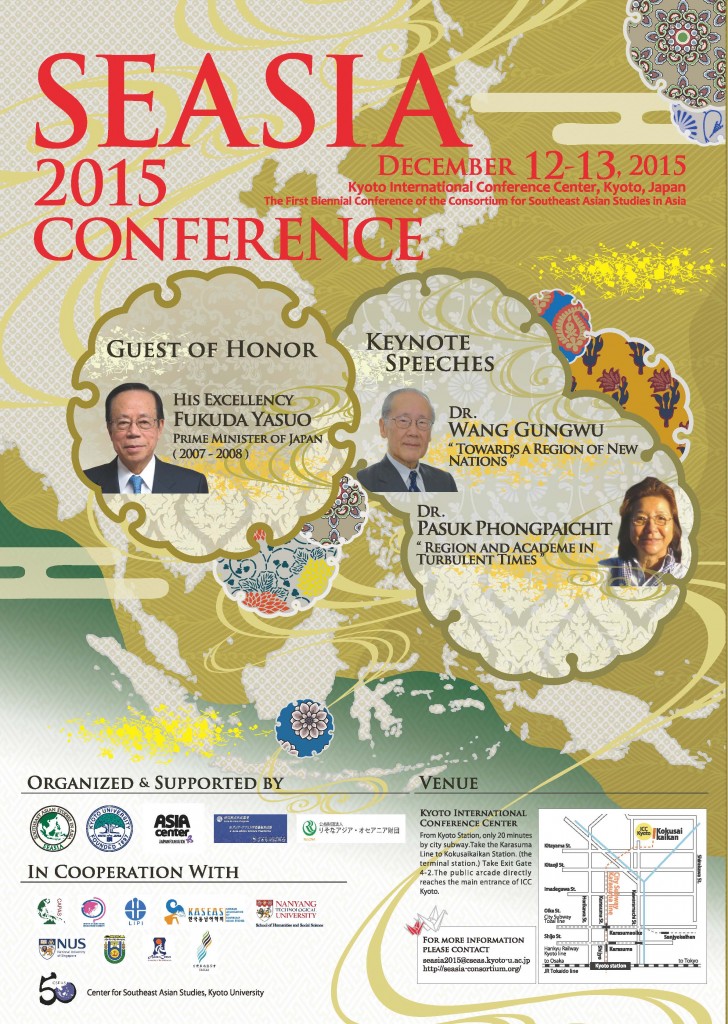
- This event has passed.
Inaugural SEASIA 2015 Conference
2015/12/12 @ 8:00 AM - 2015/12/13 @ 5:00 PM
Event Navigation
 Date: December 12-13, 2015
Date: December 12-13, 2015
Venue: Kyoto International Conference Center map »
Organized & Supported:The Japan Foundation, The Resona Foundation for Asia and Oceania, Japanese Society For Asian Studies, Kyoto University
SEASIA 2015 Conference »
Program »
Report: SEASIA 2015 Conference
The Consortium for Southeast Asian Studies in Asia held its inaugural conference, “SEASIA 2015” (pronounced “see-Asia”), at the Kyoto International Conference Center on December 12-13, 2015. This conference is the first of the biennial conferences that the Consortium is organizing as one of its major activities.
The Consortium was established in October 2013 by ten of the leading area-studies institutions in Northeast and Southeast Asia to promote region-based Southeast Asian studies. The member institutions are: Center for Asia-Pacific Studies, Academia Sinica; the Institute of Asian Studies, Chulalongkorn University;
the Indonesian Institute of Sciences; the Korean Association of Southeast Asian Studies; the Asia Research Institute, National University of Singapore; the School of Humanities and Social Sciences, Nanyang Technological University; the Taiwan Association of Southeast Asian Studies; the Institute of Asian Studies, Universiti Brunei Darussalam; and the Asian Center, University of the Philippines. Professor Sunait Chutintaranond of Chulalongkorn University is the Chairman of the SEASIA Governing Board. The Center for Southeast Asian Studies at Kyoto University currently serves as the Secretariat.
The conference’s Call for Proposals attracted some 813 proposals from 268 institutions in 28 countries. The Conference itself was attended by 530 participants from all ten of the member countries of the Association of Southeast Asian Nations (ASEAN), along with Timor Leste and fifteen other countries in Northeast Asia, the United States of America, and Europe. Nearly half of the participants were based in Southeast Asia, and more than seventy percent hailed from the Asia.
The 79 panels gathered together both young and senior, leading as well as up-and-coming scholars to explore and debate a wide array of topics ranging from the reconceptualization of Southeast Asian studies in Asia to new approaches to history and culture, from issues of mobility, development, and the environment to law and politics, economy, and the evolving regional order.
CSEAS Kyoto researchers were active in organizing or joining panels as paper presenters, discussants, and audience. A sampling of the panels convened by CSEAS staff demonstrates the disciplinary range of CSEAS and also of the topics covered at the conference: “On the Rise: Southeast Asian Studies for Region Making and Networking” (convened by Assoc. Prof. Mario Lopez), “The Emerging Myanmar and the Resurgence of Traditional Agrarian Questions” (convened by Prof. Fujita Koichi), “The Role of Media and Political Transformation in Contemporary Southeast Asia” (convened by Dr. Iga Tsukasa), “Continuities and Transformations in the Sino-Myanmar Frontier: Cross-border Religious, Commercial, and Militia Networks, 1765-2015” (convened by Dr. Imamura Masao), “New Phase of Economic Growth in Southeast Asia” (convened by Prof. Mieno Fumiharu), “Leftist Writings in Southeast Asia: New Insights and Reinterpretations on Official History” (convened by Dr. Jafar Suryomenggolo), “Social and Cultural Foundations of Care in Rural Southeast Asia” (convened by Prof. Hayami Yoko), “New Approaches to the Research and Preservation of Cambodian Cultural Heritage” (convened by Prof. Bong Sovath and Assoc. Prof. Kobayashi Satoru), and “Environment and Society: Exploring New Research Agenda” (chaired by Assoc. Prof. Nathan Badenoch and convened by Prof. Kono Yasuyuki).
Among the highlights of the conference was the ceremony on the evening of December 12, which featured speeches by the Guest of Honor, former Prime Minister of Japan, Mr. Fukuda Yasuo, and keynote addresses by Professor Wang Gungwu and Professor Pasuk Phongpaichit.
In his speech, Prime Minister Fukuda identified the challenges posed by the history question, by environmental degradation, and by ageing societies to ASEAN and the region more generally, and stressed the need for Southeast Asianists to study the issues carefully and help come up with solutions to prepare the individual countries and the region for the future.
Professor Wang’s keynote speech dealt with the construction of “Southeast Asia” as a region and as object and subject of study, and affirmed the potential of Southeast Asian studies to promote dialogues across civilizations and countries through in-depth analysis and comparisons, and through appreciation of the region’s complex, hybrid histories and dynamics.
Professor Pasuk’s keynote speech identified the economic, political and intellectual transformations of the past thirty years and the increasingly connected but also complex globalized world that have changed the terms for thinking and action in the region. She emphasized the importance of interdisciplinary work and “big thinking” in tackling the urgent issues of inequality of wealth and power, and called on academics to continue their critical engagement with the world and to protect the integrity of academic research and debate.
The next SEASIA biennial conference will be hosted by Chulalongkorn University held in Bangkok in 2017.





















